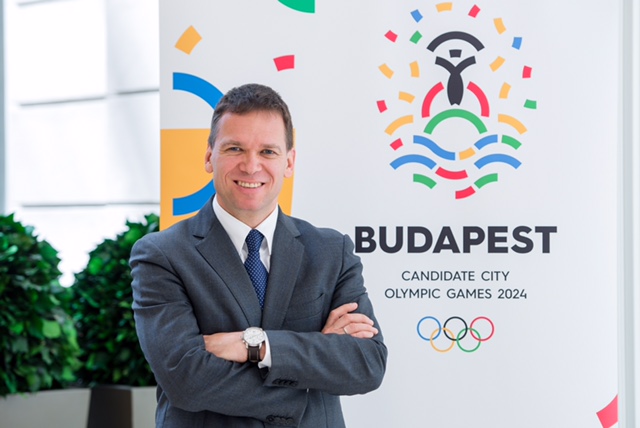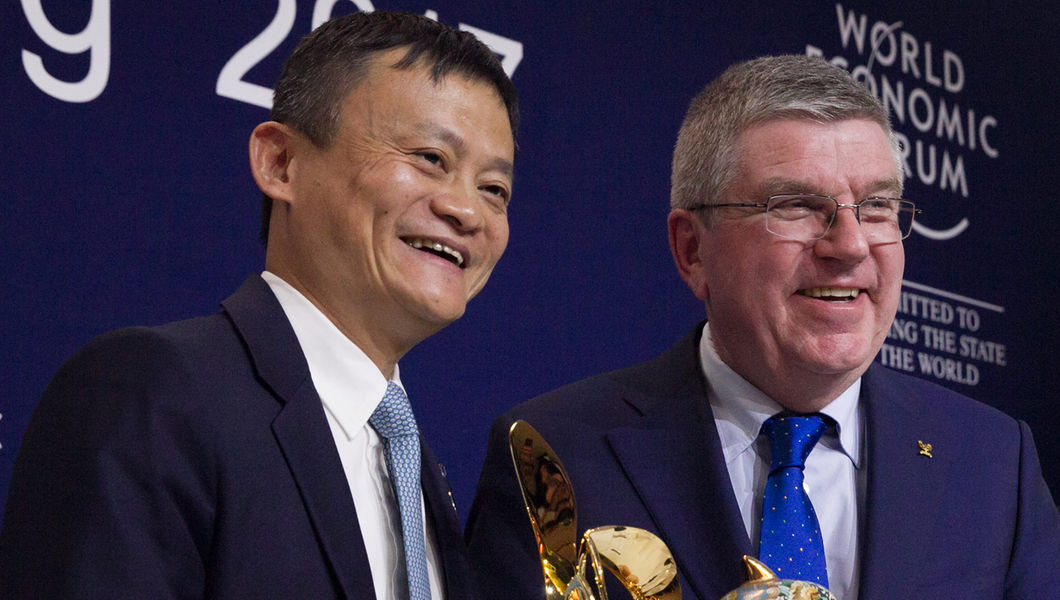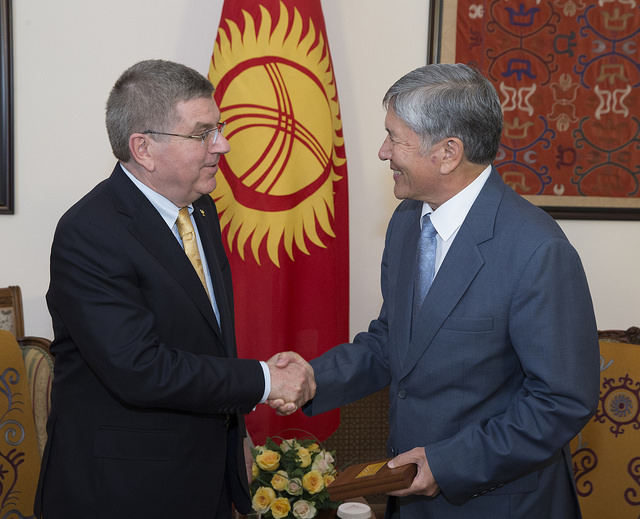Every now and then the Olympic movement produces one of the really good guys. (And women, too. Stand down, politically correct police.) The Budapest 2024 bid came Wednesday to a crashing end. It became the latest, if predictable, victim of a taxpayer revolt in Europe tied to obscenely bloated and, no coincidence, government-funded Olympic-related infrastructure costs.
Balázs Fürjes led the Budapest 2024 effort. He is one of the world’s really good people. Smart, clever, imaginative, dedicated, devoted, resourceful, patriotic, the vision thing.
It may seem perhaps a small note amid a very big problem confronting the International Olympic Committee that Balázs Fürjes will likely be sidelined, at least for a while, from the Olympic scene.
But it is altogether exceptionally telling.
Ladies and gentlemen, this column marks another in a recent series dedicated to developments in the campaign for the 2024 Games. It is straight talk; there is zero point in anything else at such a critical juncture. Apologies in advance for the length.
It’s not just that the Olympic movement is reeling from the fallout of yet another city from its last two bid races, for the 2022 Winter Games and 2024 Summer Games.
Voters in Europe are, in a phrase, pissed off, and the IOC is at an inflection point, the question being whether the members will do the only sensible thing at their assembly this September — that is, pick a privately funded entity, Los Angeles, for the 2024 Summer Games. The only other candidate left is Paris, another government-funded outfit.
Along with the assembly-line disappearance of so many cities goes a corollary, if little noticed, piece: the human capital that animates the bids, the campaigns, the would-be organizing committees.
This is, in a word, a disaster.
The Olympic movement depends on a lot of things.
It needs money, of course. A significant chunk of which, it should be noted, is American.
It needs technology and other resource.
Mostly, though, it needs people, and what people of goodwill from all corners of our imperfect world can bring to the table: creativity, innovation and inspiration.
That is why the IOC needs LA for 2024.
Yet again, here goes the disclaimer:
Yes, I live in Los Angeles, and have since the end of 1992. I married an LA girl. Our kids were born and grew up in Southern California.
For all that:
I am not an agent for the Los Angeles bid. I am not a consultant for the Los Angeles bid. I am not being paid by them. I am not, in any way, working for or on behalf of the bid.
If you know anything about the politics and geography of Los Angeles, this would be manifestly plain.
The LA 2024 people are, generally speaking, UCLA people. I teach at the USC journalism school. I live in Palos Verdes, about a half-hour south of USC on the 110 Harbor Freeway. Palos Verdes is USC country. Very close family friends are such USC freaks that they get up every USC football Saturday to claim a Coliseum tailgate space at 3 in the morning. Wednesday is trash day in our neighborhood; when I went out at 6:55 this morning to take our trash cans to the street, I said hi to my neighbor, Richard, who as ever was walking his two dogs; Richard was wearing his cardinal-and-gold USC sweatshirt.
The LA24 bid has been up and going for roughly 18 months. In that time, I have not had one coffee, one lunch, one dinner with the bid team. We have kept a respectful professional distance.
Ed Hula of Around the Rings and I are perhaps the only American reporters to have covered in depth every single IOC bid contest since 1999. I am highly confident I know what I’m talking about when it comes to these campaigns.
This is why — and even if you are a critic of my work, totally fine, you nonetheless ought to acknowledge I have at the least been thoroughly consistent — I was the first journalist anywhere to say that Boston was doomed, that the U.S. Olympic Committee had made a huge mistake and that the USOC needed to re-group and come to LA. That was way back in March 2015.
My French friends in particular may not like how explicitly straightforward this column has been in expressing why, for two years now, LA was the plain answer to the Olympic movement's obvious problem.
C’est la vie. Reminder to all: this is not personal. This is journalism.
The IOC has got itself — and this is its own damn fault — in a crack.
For roughly the past 20 years, the IOC has turned to government-underwritten Games that, time and again, have proven hugely, inappropriately expensive.
This model can be traced to Barcelona in 1992. Those Games jolted mayors, governors, prime ministers and presidents into this realization: the Olympics could serve as a seven-year public policy (that is, public works) catalyst to get built what would otherwise take 20, 30, 40 or more years to get done, if ever.
Short list from many examples: Athens (2004) metro and airport, Beijing (2008) building spree, Sochi (2014) literally two new cities (Adler, Krasnaya Polyana) from scratch.
The problem with government-funded Games is easy to explain. It's a three-step follow:
One, over the seven-year stretch from when the IOC awards a Games to the moment the cauldron is lit at an opening ceremony, governments typically can — and do — change. (See South Korea political turmoil, Winter Games 2018. Same, Rio 2016.)
Two, over those seven years, economic conditions can — and do — change. (See Rio, 2009-16).
Three, as a consequence, government commitments can — and do — change.
What this means, again in easy-to-explain language:
The bill for all those infrastructure projects, which were the in-fact underpinning of everything that led to that cauldron lighting, inevitably become grotesquely fat like yo mama.
Numbers:
$12-15 billion Athens 2004, $40 billion Beijing 2008, $15 billion-ish London 2012, presumed $20-billion Rio 2016, worries over $25-30 billion for Tokyo 2020 when the bid said it would be done for $7.8 billion, and the No. 1 monster, $51 billion, Sochi 2014.
When a bid and follow-on organizing committee are government-financed, who gets stuck with these bills?
This is elemental: taxpayers.
Now, taxpayers in western democracies are saying, no more.
Layered on to the cost concerns:
As events keep proving, taxpayers are fed up to here with the establishment and the “elite.”
The IOC — right or wrong — is the very definition of that.
In a move that underscores the IOC’s ongoing disconnect, president Thomas Bach announced a huge sponsor deal with Chinese e-commerce giant Alibaba at last month’s World Economic Forum in Davos. Of all places. Davos, symbol of the global elite.
This is why taxpayers, particularly in Europe, are telling the IOC to go, you know, itself.
This past Sunday, voters in Davos/St. Moritz, in a referendum, said no to the notion of a 2026 Winter Games. Four years before, they had said no to the idea of a 2022 Winter Games.
Indeed, for 2022, six cities in Europe dropped out, five put off to varying degrees by the $51 billion 2014 figure: Oslo, Munich, Stockholm, Davos/St. Moritz and Krakow, Poland. A sixth, Lviv, Ukraine, fell out because of war.
Five cities started for 2024 in September 2015: LA, Paris, Budapest, Rome and Hamburg, Germany.
Hamburg went out in a referendum. With it went the likes of the bid's creative chief executive, Nikolas Hill, and a hugely talented spokeswoman, Susanne Jahrreiss.
Rome pulled out because the mayor said the city had other priorities. Just like, four years beforehand, the prime minister had said the country had better things to spend money on.
Now Budapest is out.
“Many of us are already thinking of when next and how next,” Fürjes said in a late Wednesday night telephone interview from Hungary, adding, “The perception and the reality of the Olympic Games must change.”
This makes for the natural bridge to why LA for 2024.
There is now considerable worldwide talk — look it up, last September I was the first in the press to write at length about this notion — of awarding two Games at one time.
My point was LA 24 and Paris 28, not the other way around.
If there is to be a two-fer, it has to be that way: LA 24, Paris 28.
This space has made this point before so here it is again: the IOC formally accepts bids via national Olympic committees, and 2024 is the end-game for the USOC.
The IOC can not ding the United States of America’s Olympic committee three times — New York for 2012, Chicago for 2016, LA for 2024 — and expect the Americans to keep coming back. That story will be done. Finished. Over. For a long time.
If you want to believe otherwise, fine, maybe you want to believe in unicorns or fairies, too. Line up here: I have a bridge in Brooklyn for you.
Everybody needs to wrap their heads around what is, truly, reality, and the sooner the better, because in the United States it takes private money to run bids and private money to run Games and after $240 million in private money over three bids and some 14 years devoted to the three largest cities in this country, the USOC and all those generous donors would be spent, financially and, probably more important, emotionally. Done. Finished. Over.
That said:
It seems increasingly unlikely there would be a 2024-2028 two-fer. Why? There’s all kinds of resistance.
-
From other would-be bidders in Europe: if the French go down for 2024, a bunch of cities would love to bid for 2028. These would likely include Madrid, Budapest, Milan, even St. Petersburg (laugh if you wish but Mr. Putin, still, tends to have significant influence in the Olympic orbit) and, let’s face it, Paris. You can throw all the Brisbane talk you want onto the barbie but no way the IOC is going to Australia in October — not with the way television ratings tanked in September in Sydney in 2000.
-
From the IOC members: there was no two-fer in the 2022 Winter Games race, when the race got down to two, just Beijing and Almaty, Kazakhstan, so why a Summer 2024 two-fer? Many of the IOC members already complain they do less than Tarzan’s tailor. Voting on the site of the Games is their one big responsibility. Taking that away would be yanking away the essential perk of membership.
-
From LA24: if you are the LA people, why hedge? In a two-dog race, if you are LA, you would have to quietly and humbly like (to take) your chances against Paris.
Why?
What is the IOC’s No. 1 problem?
Again, keeping it simple: as this taxpayer revolt has proven, the IOC has a massive credibility problem.
At the core of that credibility problem is a branding problem.
Let’s put sentimentality away. You like French wine? Awesome. There’s great wine in California, too.
At issue is what is best for the Olympic movement, not just for 2024 but for years into the future.
Paris is talking only 2024. LA is talking 2024 and — beyond, well beyond. That is what is at stake.
Let’s frame what’s what this way:
-
Does the IOC want a 2024 Old World Games … in an older city … that will be paid for by government … a government almost surely subject to change/s over seven years … when Frexit is suddenly a major issue … when the government will have to build an athletes’ village … that if history is a reliable guide will cost way more than budgeted … in a precinct that is currently being rocked by violence … not far from where the central stadium was hit by a terror attack … in a city where over seven years the city will no doubt endure public strikes … and the weather every summer, which is why the locals flee, is hot and muggy?
Or:
-
Does the IOC want a privately run Games that, because it’s privately run, has no margin for error and has to come in at or under budget, just like 1984 … with an already-built village at UCLA where thousands of college kids happily come and go every day … in perfect California summer sunshine … in a city where the Olympics have an approval rating nearing 90 percent … in a region and state that’s full of youth, tech and social media and that will, like 1984, kickstart it all over again for the movement for an entire generation?
To reiterate: in Europe, the IOC is getting thrashed but in LA, based on sunny memories from 1984 and 1932, the locals when most recently polled said yes to the Olympic Games to the tune of 88 percent.
When logic is applied, what about this is even remotely a remotely difficult choice?
Earlier this month, the Paris bid unveiled its slogan on the Eiffel Tower to what officials thought was great fanfare: “Made for Sharing.” In English. With great respect to the French academy, because its job is to protect the French language, next came the howls of protest. The next thing you knew, the slogan was suddenly “Venez Partager” along with the English version.
What 16-year-old skateboarder or surfer would possibly care?
https://twitter.com/TonyESTANGUET/status/834374881919762432
In announcing that "sharing" slogan in English, our Paris friends had a good laugh at American expense, they thought, because it was a not-so-subtle play on bridges and walls and the American president. Then it turns out the French authorities are, for security purposes, going to build a wall around the Eiffel Tower.
Karma, people.
Back to Rio, and the government chaos that bedeviled nearly everything there. Whether Marine le Pen wins the French elections this spring or not, who wants to believe that for the next seven years the French government is going to rest in a state of calm serenity?
Rail on Donald Trump, or whatever. A privately funded Los Angeles enterprise means that whatever is going on in Washington is, for the most part, going in Washington. LA is LA is LA. This is the key distinction that underpins a privately organized American bid, and right now this is the secret to what the IOC needs — it needs time, it needs stability and it needs all the other stuff LA and California can bring to the table, in particular creative energy.
The world’s leading brands are based in California. More logic and rational thinking — ask whether this isn’t precisely what the IOC needs a little or maybe a lot of for 2024 and beyond:
The range of Hollywood studios. Disney. Snapchat. Facebook. Apple. Twitter. Netflix. Electronic Arts. Oracle.
Feeling a little more creative? Annex Oregon and Washington just up the Pacific coast: Nike and Microsoft, for starters. Throw in Starbucks. Or, back to LA, The Coffee Bean & Tea Leaf (big in Asia, too).
Seriously, why the Olympic movement doesn’t have an association with Starbucks or Coffee Bean — where do young people hang out and soak up the free WiFi, for god’s sake — is beyond common sense.
Balázs Fürjes was careful on the telephone not to endorse either of the remaining two bids. Even so, the IOC president, executive board and members — for that matter, anyone with an interest in the Olympic movement’s future — ought to pay careful attention to his words.
“Something,” he said, “is going in the wrong direction.”









